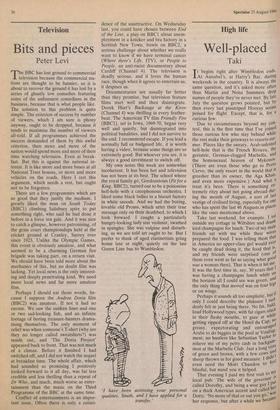Television
Bits and pieces
Peter Levi
The BBC has lost ground to commercial television because the commercial sta- tions are thought to be funnier, so it is about to recover the ground it has lost by a series of ghastly low comedies featuring some of the unfunniest comedians in the business, because that is what people like. The solution to this problem is quite simple. The criterion of success by number of viewers, which I am sure is phony anyway, ought to be dropped, because it tends to maximise the number of viewers all-told. If all programmes achieved the success demanded of them by this awful criterion, then more and more of the nation would spend more and more of their time watching television. Even at break- fast. But this is against the national in- terest. It is like more and more buses at all National Trust houses, or more and more vehicles on the roads. Here I rest this argument, which needs a rest, but ought not to be forgotten.
There are a few programmes which are so good that they justify the medium. I greatly liked the man on South Today (BBC1) climbing Salisbury spire to put something right, who said he had done it before in a force ten gale. And it was nice to catch a glimpse, however patronising, of the grass court championships held at the cricket ground at Cranley, Surrey ever since 1923. Unlike the Olympic Games, this event is obviously amateur, and what seemed to be a charming German fire brigade was taking part, on a return visit. We should have been told more about the mechanics of this, but no doubt film was lacking. Yet local news is the only interest- ing and deeply penetrating kind. We need more local news and far more amateur film.
Perhaps I should eat those words, be- cause I suppose the Andrea Doria film (BBC2) was amateur. If not it had no excuse. We saw the sunken liner and one or two sad-looking fish, and an infinite footage of boring treasure-hunters drama- tising themselves. The only moment of relief was when someone's T-shirt (why are they no longer called sweatshirts?) was inside out, and 'The Doria Project' appeared back to front. That was not much of a climax. Before it finished I had switched off, and I did not watch the sequel at breakfast time. The whole affair, which had sounded so promising I positively looked forward to it all day, was far less credible and less thrilling than a repeat of Dr Who, and much, much worse as enter- tainment than the music on the Third Programme of the BBC at the same time.
Conflict of entertainments is an impor- tant issue, Often there is only a coinci-
dence of the unattractive. On Wednesday last, you could have chosen between End of the Line, a play on BBC1 about unem- ployment in a knicker and bra factory in a Scottish New Town, bowls on BBC2, a serious challenge about whether we really want to know if we have terminal cancer (Where there's Life, ITV), or People to People, an anti-racist documentary about Cardiff (Channel 4). The television is deadly serious, and it loves the human race, though when it agrees to entertain us, it despises us.
Documentaries are usually far better than they promise, but television feature films start well and then disintegrate. Derek Hart's Backstage at the Kirov (Channel 4) was thrilling in every feather- beat. The American TV film Friendly Fire (BBC1), set in Iowa, 1969-70, began very well and quietly, but disintegrated into political banalities, and I did not survive to the end. I recommend escape. If you lead a normally full or badgered life, it is worth having a video, because some things are so extremely good. But whoever you are, it is always a good investment to switch off.
My own notes this week are somewhat incoherent. It has been hot and television has not been at its best. The school where the royal family go, Gordonstoun (Fit for a King, BBC2), turned out to be a poisonous hell-hole with a cacophonous orchestra. I liked some black ladies in a biscuit factory in white snoods. And we had the boring, lovable old Proms, which utter their true message only on their deathbed, to which I look forward. I caught a particularly hungry-looking lady star violinist, swathed in spangles. She was vulpine and disturb- ing, as we are told art ought to be. But I prefer to think of aged clarinettists going home late at night, quietly on the last Green Line bus to Wimbledon.
'I have been assessing your personal qualities, Smith, and I have applied for a transfer.'






































 Previous page
Previous page